
Commercial Security Systems in San Diego | Business Security Solutions
FROM PIONEER SECURITY SERVICES
Commercial security systems in San Diego protect businesses from theft, vandalism, and liability through integrated CCTV, access control, and alarm monitoring tailored to coastal environments and local crime patterns. Whether managing a downtown retail location, Kearny Mesa warehouse, or multi-tenant office building, businesses require professionally designed security infrastructure that addresses San Diego’s unique challenges—from marine corrosion near the coast to heightened property crime in commercial districts. We specialize in creating comprehensive security solutions that combine advanced surveillance technology with 24/7 monitoring to safeguard San Diego businesses across every industry sector.
What Are the Main Types of Commercial Security Systems?
Modern commercial security systems integrate four core components that work together to create layered protection for San Diego businesses. Each technology serves a specific security function while contributing to an overall defense strategy that adapts to evolving threats and operational needs.
What Does CCTV and Video Surveillance Protect Against?
CCTV and video surveillance systems deter criminal activity while providing forensic evidence for incidents at commercial properties throughout San Diego County. High-resolution cameras capture detailed footage of theft attempts, vandalism, and liability incidents, with modern IP systems offering remote viewing capabilities that allow business owners to monitor multiple locations from smartphones or computers. CCTV systems are associated with a 13% reduction in crime, according to a systematic review. Video analytics software enhances traditional recording by detecting unusual behavior patterns, triggering alerts for loitering, perimeter breaches, or after-hours activity that human operators might miss.
How Does Access Control Improve Commercial Site Security?
Access control systems regulate entry to San Diego commercial properties through electronic credentials, eliminating vulnerabilities associated with traditional keys and providing detailed audit trails of all access events. These systems integrate card readers, biometric scanners, and mobile credentials to create customized access levels for employees, contractors, and visitors while maintaining compliance with fire codes that require emergency egress capabilities. Multi-tenant office buildings in Mission Valley and UTC benefit from hierarchical access structures that separate tenant spaces from common areas, while distribution centers near the border employ multi-factor authentication to protect high-value inventory zones. Cloud-based access platforms enable real-time credential management, allowing facility managers to instantly revoke access for terminated employees or grant temporary permissions for maintenance personnel.
How Do Intrusion and Alarm Systems Work for Businesses?
Commercial intrusion detection systems combine door contacts, motion sensors, glass break detectors, and environmental monitors to create comprehensive perimeter and interior protection for San Diego businesses. These systems connect to central monitoring stations that verify alarms and dispatch police response within minutes of activation, with dual-path communication ensuring signals reach monitoring centers even if phone lines are compromised. Advanced commercial alarm panels support zone-based arming that allows partial system activation for cleaning crews or early-arriving employees while maintaining full protection in sensitive areas like server rooms or inventory storage. Integration with surveillance cameras enables visual alarm verification, reducing false alarm fees that San Diego Municipal Code Section 33.3712 imposes after excessive dispatches.
What Role Does 24/7 Monitoring and Alarm Response Play?
Professional monitoring services transform passive security equipment into active protection systems by providing continuous oversight and immediate response coordination for San Diego businesses. UL-listed monitoring centers staffed with trained operators verify alarm signals through two-way voice communication or video feeds before dispatching police, fire, or private security personnel to commercial properties. This verification process reduces response times while preventing costly false alarms that strain municipal resources and result in fines. For businesses operating across multiple time zones or with irregular hours, 24/7 monitoring ensures consistent protection regardless of staffing levels, with customized response protocols that might include contacting multiple keyholders, activating lockdown procedures, or initiating evacuation announcements through integrated PA systems.
Watch our guards stopping crimes before they start!
How Do Commercial Security Systems Differ by Industry or Site Type?
San Diego’s diverse commercial landscape demands security solutions tailored to specific operational requirements, risk profiles, and regulatory environments across different business sectors. Understanding these industry-specific needs ensures optimal protection while maintaining operational efficiency.
What Security Solutions Work Best for Retail and Malls?
Retail security systems in San Diego shopping centers like Fashion Valley and Westfield UTC combine high-resolution cameras with analytics software to prevent organized retail theft while enhancing customer experience. Point-of-sale integrated cameras capture transaction details synchronized with video footage, enabling loss prevention teams to identify fraudulent returns or employee theft patterns. Facial recognition capabilities help identify known shoplifters across multiple store locations, while people counting analytics provide valuable traffic data for merchandising decisions. We design retail systems with discrete dome cameras that maintain aesthetic appeal while providing comprehensive coverage of sales floors, stockrooms, and loading docks where merchandise movement creates vulnerability.
What Should Warehouses and Distribution Centers Use?
San Diego warehouses and distribution facilities near Otay Mesa and Miramar require perimeter security systems that detect intrusions before perpetrators reach valuable inventory. Thermal imaging cameras combined with video analytics create virtual fence lines that trigger alerts when vehicles or individuals cross predetermined boundaries, while license plate recognition systems log all vehicle entries for cargo tracking and investigation purposes. High-mounted PTZ cameras provide operators with rapid response capabilities to track suspicious activity across large exterior areas, while interior systems focus on dock doors, high-value storage zones, and shipping/receiving areas where inventory shrinkage typically occurs. Integration with warehouse management systems enables automatic camera positioning based on pick schedules, ensuring documentation of all inventory movements.
What Are Best Practices for Office Buildings and Multi-tenant Properties?
Multi-tenant office properties in downtown San Diego and Sorrento Valley implement layered security architectures that balance tenant privacy with property-wide protection. Visitor management systems integrate with access control platforms to issue temporary credentials while maintaining compliance with fire marshal occupancy tracking requirements. Common area surveillance covers lobbies, elevators, parking structures, and building perimeters without intruding on individual tenant spaces, while allowing tenants to integrate private systems through secure network segmentation. Building management systems interface with security platforms to automate responses like elevator lockouts during emergencies or HVAC adjustments based on occupancy detected through access control data.
How Much Do Commercial Security Systems Cost in San Diego?
Commercial security system investments in San Diego vary significantly based on property size, technology selection, and integration requirements, with properly designed systems delivering measurable returns through loss prevention and operational efficiency improvements.
What Factors Influence Installation and Ongoing Costs?
Installation costs for San Diego commercial security systems depend on infrastructure complexity, with new construction offering easier cable routing than retrofit projects in historic Gaslamp Quarter buildings requiring surface-mount conduits. Basic four-camera systems with local recording start around $3,000-$7,000, while enterprise-grade installations for 50,000 square foot warehouses with 30+ cameras, access control, and monitoring typically range from $3,000-$10,000 for basic setups scaling higher. Southern California labor rates add to national installation averages due to prevailing wage requirements and specialized low-voltage licensing. Ongoing costs include monitoring services ($50-$200 monthly), maintenance agreements ($100-$500 monthly), and software licensing for advanced analytics or cloud storage features.
How Can Businesses Estimate Return on Investment (ROI)?
Security system ROI calculations for San Diego businesses incorporate direct loss prevention, insurance premium reductions, and operational efficiency gains that often recover initial investments within 18-24 months. Retail clients typically report 20-40% reductions in shrinkage after implementing integrated surveillance and analytics, translating to tens of thousands in recovered inventory annually for mid-size stores. Insurance carriers offer premium discounts of at least 5% for businesses with professionally monitored security systems, as reported by the Insurance Information Institute. Indirect benefits include reduced liability exposure from slip-and-fall claims, improved employee productivity from reduced internal theft concerns, and enhanced property values for commercial real estate with comprehensive security infrastructure.
How Do Local San Diego Factors Affect System Selection?
San Diego’s unique geographic and demographic characteristics create specific security challenges that influence equipment selection and system design decisions for commercial properties throughout the region.
How Does Coastal Environment Impact Equipment Choice and Maintenance?
San Diego’s coastal environment exposes outdoor security equipment to salt air corrosion that significantly reduces component lifespan without proper protection. Marine-grade stainless steel housings and sealed cable connections rated IP66 or higher prevent moisture intrusion that causes camera failure within months in standard equipment. AMPP classifies coastal areas with moderate salt content as C4 (high corrosivity), requiring specialized coatings and more frequent maintenance than inland installations. We specify cameras with built-in heaters and cooling systems to combat condensation during marine layer conditions while maintaining clear imagery, and recommend quarterly cleaning schedules to remove salt deposits that degrade lens clarity and housing integrity.
What Are Crime Trends and High-risk Areas in San Diego?
Commercial crime patterns in San Diego vary significantly by neighborhood, with the San Diego Association of Governments (SANDAG) crime data showing concentrated property crime in downtown, City Heights, and National City commercial corridors. Organized retail theft rings target high-end shopping centers in La Jolla and Del Mar, while cargo theft primarily affects distribution facilities near the Mexican border and port areas. These geographic risk factors influence security system design through increased camera density, enhanced perimeter detection, and integration with regional crime intelligence networks that share threat information between businesses. Recent increases in catalytic converter theft require specific coverage of parking areas with license plate capture capabilities, while homeless encampment issues near commercial properties demand balanced approaches using audio deterrents and improved lighting rather than aggressive enforcement.
What Are the Legal, Compliance, and Insurance Considerations?
California’s strict privacy laws and San Diego’s municipal regulations create complex compliance requirements for commercial security systems that must balance protection with legal obligations.
What Privacy and Surveillance Laws Apply in California?
California privacy laws impose significant restrictions on commercial surveillance systems, with California Penal Code Section 632 prohibiting audio recording without consent and requiring visible notice for video surveillance in areas where privacy expectations exist. The California Consumer Privacy Act (CCPA) classifies surveillance footage containing identifiable individuals as personal information, mandating data protection measures and retention policies for businesses meeting revenue thresholds. San Diego businesses must post clear signage at all entrances indicating video surveillance, while avoiding camera placement in restrooms, break rooms, or changing areas where privacy violations could result in significant liability. We ensure compliance through camera placement audits, privacy-compliant recording configurations that disable audio by default, and retention policies that automatically delete footage after 30-60 days unless flagged for incident investigation.
How Do Security Systems Affect Insurance Premiums and Liability?
Commercial property insurance carriers in San Diego increasingly require professional security systems for businesses in high-risk categories or locations, with premium adjustments reflecting the level of protection implemented. The Insurance Information Institute reports that businesses with monitored alarm systems and surveillance cameras qualify for premium reductions of at least 5%. Security footage serves as crucial evidence in liability claims, protecting businesses from fraudulent slip-and-fall lawsuits. However, inadequate security can increase liability exposure under premises liability doctrine if criminals exploit known vulnerabilities to harm customers or employees, making professional system design essential for both protection and legal defensibility.
How Is a Commercial Security System Designed and Installed?
Professional security system implementation follows structured methodologies that ensure comprehensive coverage, code compliance, and minimal business disruption during installation phases.
What Is the Typical Project Timeline and Key Milestones?
Commercial security projects in San Diego typically span 4-8 weeks from initial consultation to system commissioning, with larger installations requiring extended timelines for permitting and infrastructure preparation. The design phase includes site surveys using 3D modeling software to optimize camera placement, access control point mapping, and integration planning with existing building systems. City of San Diego Development Services requires low-voltage permits for commercial security installations, with review periods averaging 10-15 business days for standard projects. Installation scheduling coordinates with business operations to minimize disruption, often utilizing weekend or after-hours work for critical areas. System commissioning includes comprehensive testing of all components, operator training, and documentation delivery before transitioning to ongoing support agreements.
Who Should Be Involved from the Client Side (Facilities, IT, Security)?
Successful security system implementations require cross-functional collaboration between facilities management, IT departments, and security personnel to address technical requirements and operational procedures. Facilities managers provide building plans, identify sensitive areas, and coordinate installation access while ensuring compliance with lease agreements in multi-tenant properties. IT teams establish network architecture for IP-based systems, implement cybersecurity protocols, and manage bandwidth allocation for video streaming and storage. Security directors or loss prevention managers define operational requirements, establish monitoring procedures, and develop response protocols that align with corporate policies. We facilitate stakeholder meetings throughout the project lifecycle to ensure all perspectives inform system design and implementation decisions.
How Do Businesses Maintain and Test Security Systems Over Time?
Proactive maintenance programs prevent security system failures while ensuring optimal performance throughout equipment lifecycles in San Diego’s challenging environmental conditions.
What Are Recommended Maintenance and Service Plans?
Commercial security systems require quarterly maintenance visits that include camera cleaning, focus verification, cable connection inspection, and firmware updates to address vulnerabilities. San Diego’s coastal properties need additional attention to corrosion prevention through protective coating applications and seal replacements that prevent moisture intrusion. Comprehensive service agreements include priority response for system failures, remote diagnostics capabilities, and annual technology reviews that identify upgrade opportunities as security threats evolve. Budgeting annually for maintenance and updates ensures continued effectiveness and extending equipment lifespan beyond manufacturer warranties.
How Often Should Cameras, Sensors, and Backup Power Be Tested?
Monthly testing protocols verify all security components function correctly, with automated health monitoring systems alerting technicians to failures between scheduled visits. Camera tests confirm proper focus, night vision operation, and motion detection sensitivity while checking for obstructions from vegetation growth or construction changes. Access control systems require quarterly audits to remove terminated employee credentials and verify emergency egress functionality mandated by fire codes. Backup power systems including UPS units and generators need monthly load tests and annual battery replacements to ensure continued operation during San Diego’s occasional power disruptions from wildfire prevention shutoffs. We provide detailed testing logs for insurance and compliance documentation while scheduling tests during low-traffic periods to minimize business disruption.
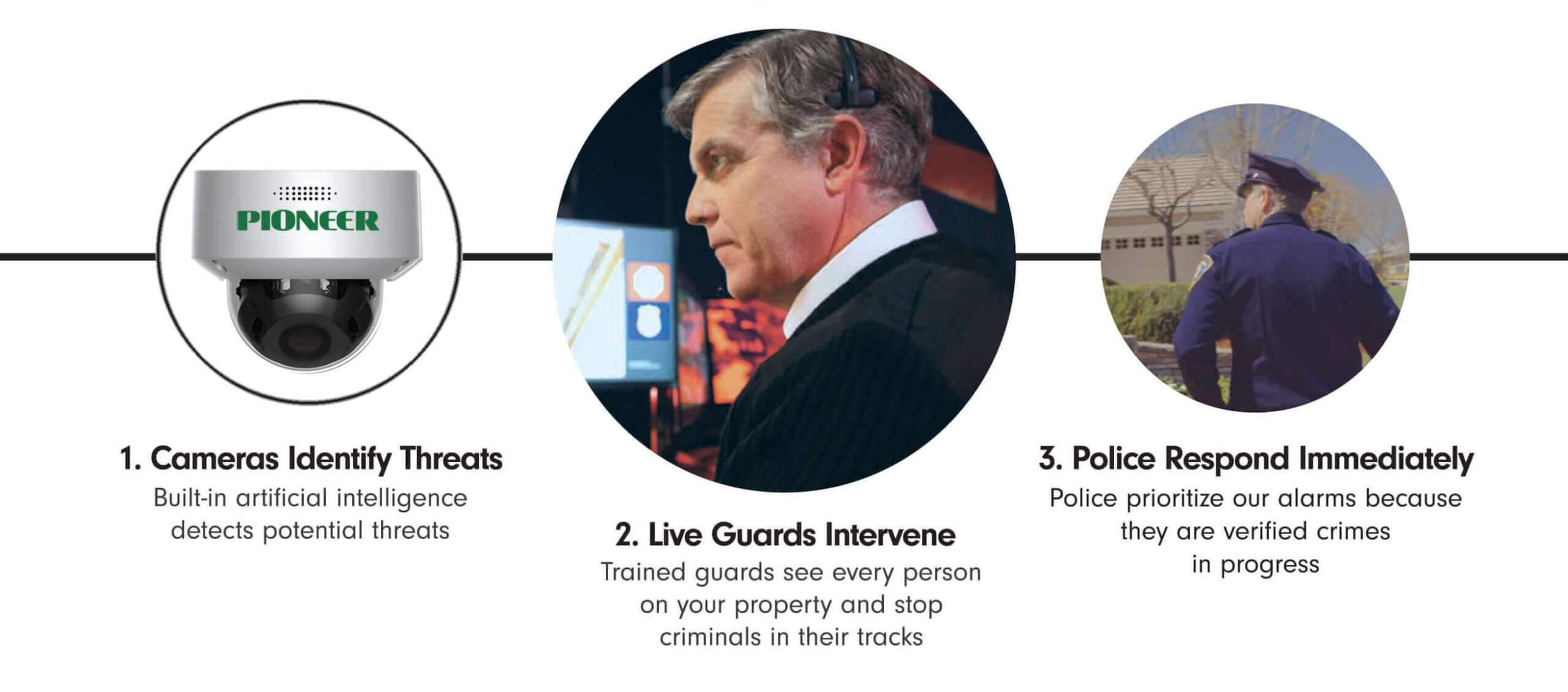
How Do Businesses Integrate Security Systems with Existing IT and Reporting?
Modern security platforms leverage IT infrastructure to deliver advanced capabilities while requiring careful implementation to prevent cybersecurity vulnerabilities.
What Are Best Practices for Networked Cameras and Cybersecurity?
IP-based security systems connect to corporate networks but require segregation through VLANs and firewall rules to prevent unauthorized access to surveillance feeds or business data. The Cybersecurity and Infrastructure Security Agency (CISA) recommends changing default passwords, enabling encryption for all video streams, and implementing multi-factor authentication for system access. Regular firmware updates address discovered vulnerabilities, while network monitoring tools detect unusual traffic patterns indicating potential breach attempts. We configure systems with principle of least privilege, granting users only necessary access levels and maintaining detailed audit logs of all system interactions for forensic analysis if incidents occur.
How Do Integrations with Access Logs and Visitor Management Improve Safety?
Security system integrations with visitor management platforms and access control databases create comprehensive activity records that enhance investigation capabilities and operational insights. When access card swipes trigger nearby cameras to bookmark footage, security teams quickly locate relevant video for incident investigation without reviewing hours of recordings. Visitor management integration captures photo identification synchronized with temporary access credentials, creating verifiable audit trails for contractor and guest access. Building management system interfaces enable automated responses like lighting activation when motion sensors detect after-hours activity or HVAC adjustments based on occupancy data from access control systems. These integrations transform discrete security components into unified platforms that improve both protection and operational efficiency.
How Do You Choose the Right Commercial Security Vendor in San Diego?
Selecting a commercial security partner requires evaluating technical capabilities, local experience, and service commitments that ensure long-term system effectiveness.
What Questions Should You Ask During a Vendor Evaluation?
Critical vendor evaluation questions assess technical expertise, financial stability, and commitment to ongoing support for San Diego businesses. Request references from similar-sized businesses in your industry, particularly those operating in coastal environments with comparable corrosion challenges. Verify licensing through the California Bureau of Security and Investigative Services which requires specific certifications for alarm company operators and technicians. Evaluate response time commitments for service calls, availability of local inventory for common repairs, and experience with your preferred technology platforms. Ask about technician training programs, manufacturer certifications, and participation in industry associations that demonstrate commitment to professional development.
What Certifications, Warranties, and Service Level Agreements (SLAs) Matter?
Professional certifications validate technical competency and adherence to industry standards, with UL listings for monitoring centers and NICET certifications for system designers indicating quality commitments. Manufacturer certifications from major brands ensure access to technical support, extended warranties, and advanced training that smaller dealers cannot obtain. Service level agreements should specify maximum response times for critical failures (typically 4 hours), scheduled maintenance windows, and financial remedies for SLA violations. Equipment warranties extend beyond manufacturer minimums when dealers maintain authorized status, with professional installations qualifying for enhanced coverage that protects your investment. We maintain all relevant certifications while offering comprehensive SLAs backed by our local presence and dedicated San Diego technical team.
What Should Facility Managers Expect During a Free Site Assessment?
Professional security assessments provide detailed analyses of vulnerabilities, technology recommendations, and implementation roadmaps tailored to specific business needs.
What Information Will the Technician Provide in the Proposal?
Comprehensive security proposals include detailed floor plans showing proposed camera locations with coverage maps, access control points, and sensor placements optimized through professional design software. Cost breakdowns separate equipment, installation labor, and ongoing service fees while identifying potential phasing options for budget-conscious implementations. Technical specifications detail model numbers, capabilities, and integration requirements for all proposed components, enabling informed comparisons between vendors. The proposal includes projected timelines, required permits, and coordination requirements with other trades or building systems. We provide 3D renderings showing expected camera views and access control workflows, helping stakeholders visualize the completed system before committing to installation.
How Are Recommendations Prioritized (Safety, Compliance, Budget)?
Security recommendations follow risk-based prioritization methodologies that address immediate safety concerns, regulatory compliance requirements, and budget constraints through phased implementation strategies. Life safety issues like emergency egress monitoring and fire system integration receive highest priority, followed by compliance requirements for specific industries like cannabis or pharmaceuticals. High-risk areas identified through crime statistics and vulnerability assessments guide initial phase implementations, with expansion options designed into infrastructure to support future growth. Budget considerations influence technology selection between enterprise and mid-tier solutions while maintaining effectiveness for critical protection needs. Our assessment reports clearly categorize recommendations by priority level, enabling businesses to make informed decisions about immediate implementations versus planned expansions.
How Can Pioneer Security Protect My San Diego Business Today?
Pioneer Security delivers comprehensive commercial security solutions designed specifically for San Diego’s unique business environment, combining coastal-rated equipment with local expertise spanning over two decades. Our certified technicians understand the specific challenges facing businesses from La Jolla to Chula Vista, whether protecting high-value retail inventory, securing sensitive data centers, or managing multi-tenant access control complexities. We maintain a local inventory of commercial-grade security equipment in San Diego County, ensuring rapid response for both new installations and emergency repairs. Contact us today at (800) 824-8844 to schedule your free security assessment and receive a customized protection plan that addresses your specific vulnerabilities while maximizing return on security investment.
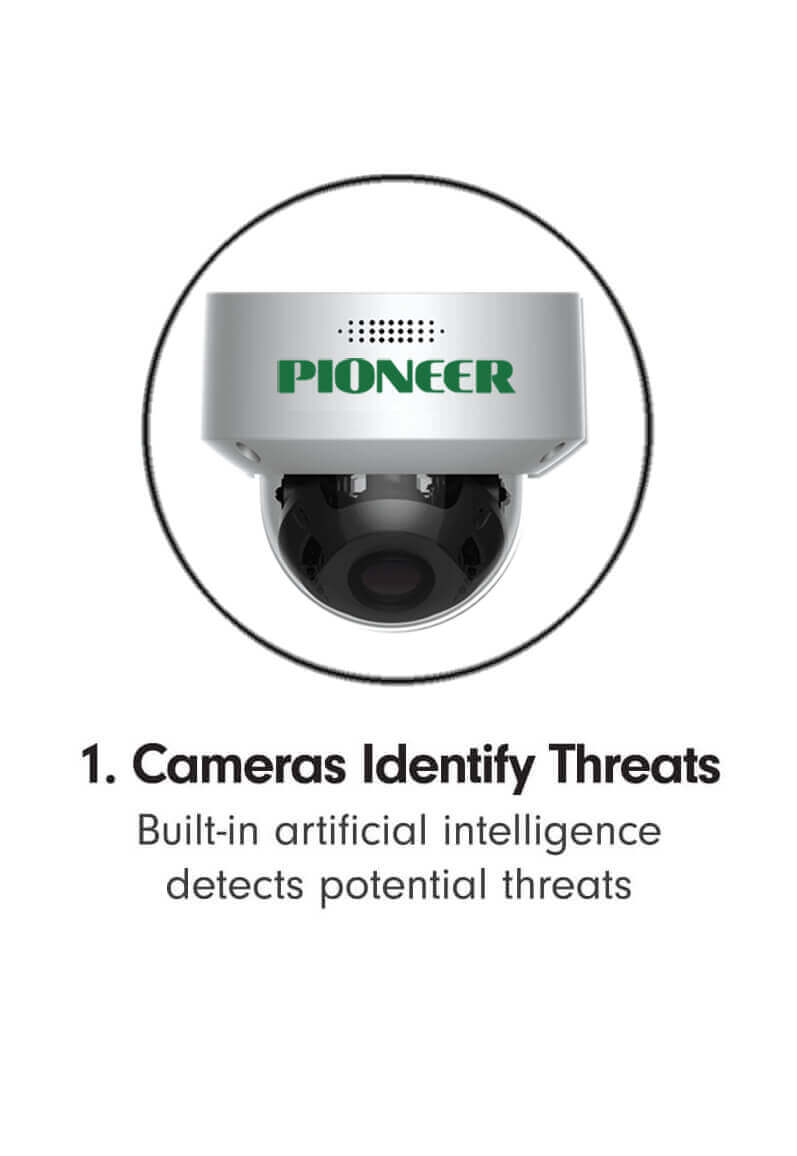


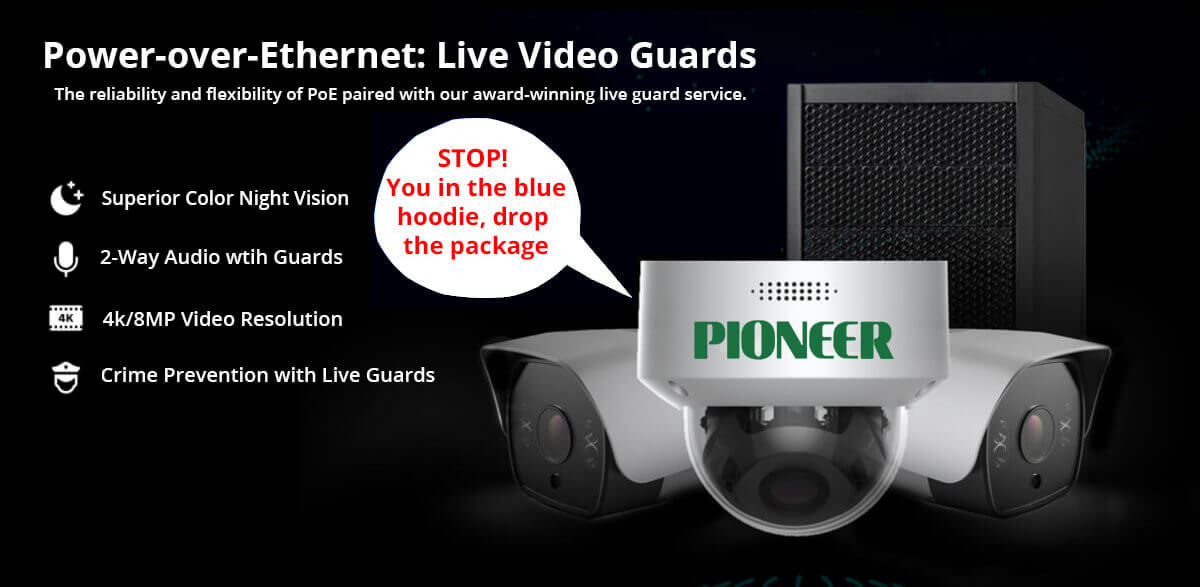
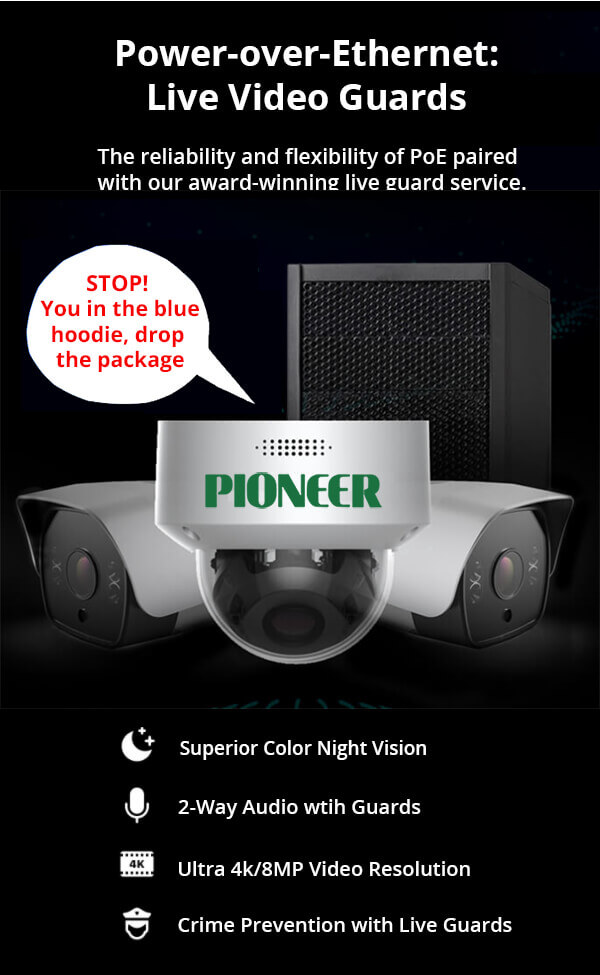

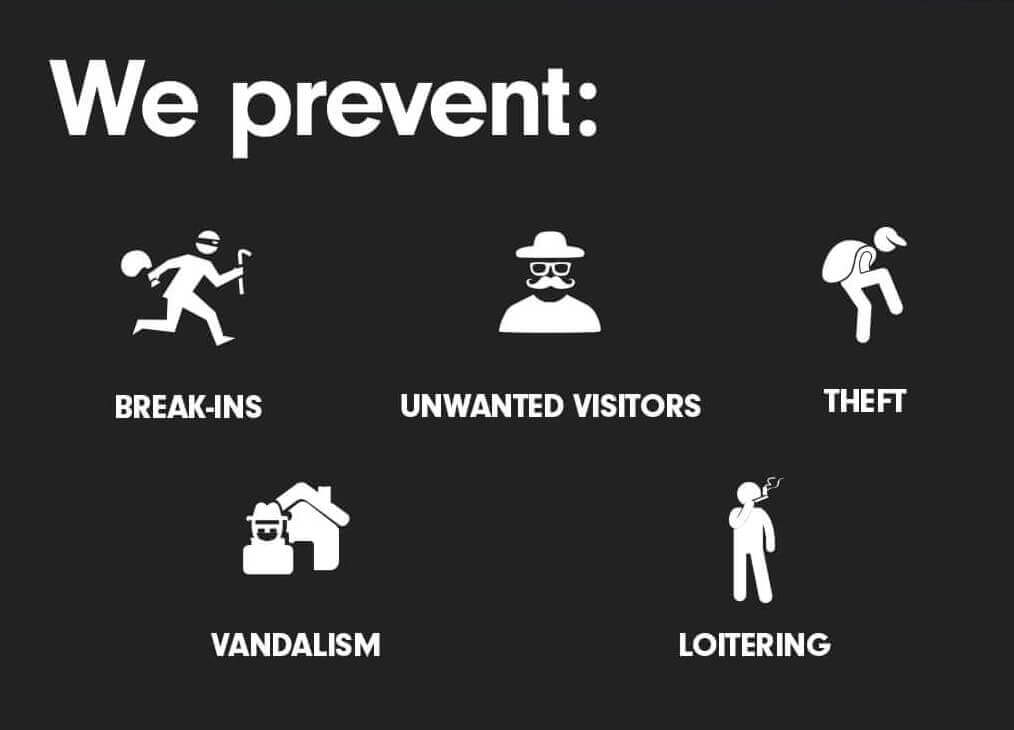
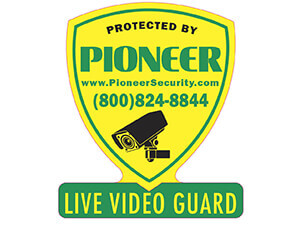
1. Pioneer Sign
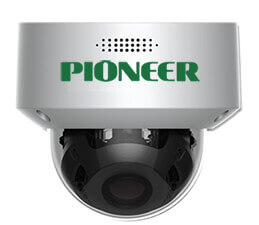 3. Video Camera
3. Video Camera
- Power-over-Ethernet
- Dome and bullet video cameras
- 4k/8MP video
- 2-way audio
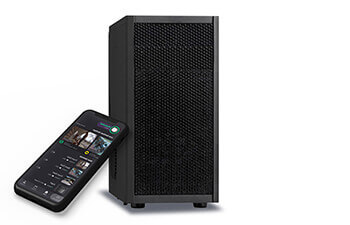 2. AI PoE Hub
2. AI PoE Hub
- Advanced AI powered by Nvidia GPU
- 4TB hard drive
- Supports up to 15 PoE cameras
- Instant alerts and access via mobile app
- Live video escalation to human guards

4. Guards

1. Pioneer Sign
- Pioneer Security signs warn trespassers that your property is monitored by live video guards.
- These signs are the first line of defense in deterring crime.
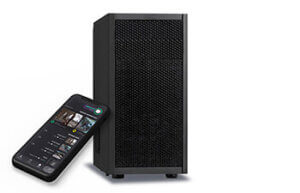
2. AI PoE Hub
- Advanced AI powered by Nvidia GPU
- 4TB hard drive
- Supports up to 15 PoE cameras
- Instant alerts and access via mobile app
- Live video escalation to human guards

3. Video Camera
- Power-over-Ethernet
- Dome and bullet video cameras
- 4k/8MP video
- 2-way audio

4. Guards
- On duty 24/7 stationed in the US
- Professional responses to potential threats
- Can dispatch police via a 911 call from your business address
- Privacy mode gives you full control
Welcome To Pioneer Security Services, Inc.
Family Owned and Operated, Security Systems San Diego Since 1978.

Howard Feldman, Founder and President
Whether your security needs are for your home, small business, or corporation, Pioneer Security Services has the products and industry experience you need to ensure your safety and peace of mind. Our clients appreciate our hands-on approach to service. You are never just an account number at Pioneer Security. We take pride in pampering our clients with personal service that goes above and beyond expectations.
Live Video Guards
Our newest security innovation is a live video guard system that protects the exterior of your property with two-way voice surveillance. Because our guards interact with vandals and other unwanted visitors before they enter your business or home, we stop crime before it starts. Live video guards reduce both property losses and false alarm fees. Call us today and ask us how live surveillance can improve your security.
Howard L. Feldman
Founder and President
Welcome To Pioneer Security Services, Inc.
Family Owned and Operated, Security Systems San Diego Since 1978.

Howard Feldman, Founder and President
Whether your security needs are for your home, small business, or corporation, Pioneer Security Services has the products and industry experience you need to ensure your safety and peace of mind. Our clients appreciate our hands-on approach to service. You are never just an account number at Pioneer Security. We take pride in pampering our clients with personal service that goes above and beyond expectations.
Live Video Guards
Our newest security innovation is a live video guard system that protects the exterior of your property with two-way voice surveillance. Because our guards interact with vandals and other unwanted visitors before they enter your business or home, we stop crime before it starts. Live video guards reduce both property losses and false alarm fees. Call us today and ask us how live surveillance can improve your security.
Howard L. Feldman
Founder and President
Pioneer's Proactive Video Monitoring Stops Crime Before it Starts
Want to learn more? Just drop us a line:
